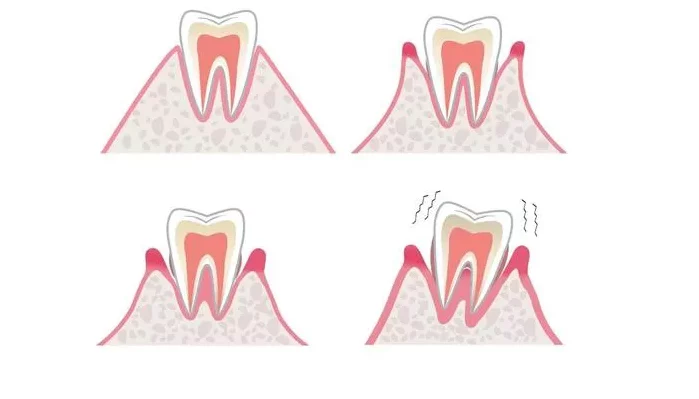Periodontal disease is a common oral disease that affects the gums and bone tissue around the teeth. People with periodontal disease need to pay attention to their diet and avoid eating foods that are harmful to oral health. In this article, we will go into detail about the definition of periodontal disease, what foods people with periodontal disease should avoid, and which foods are good for people with periodontal disease. At the same time, we will also cover how to develop a diet plan suitable for people with periodontal disease to help them better manage their periodontal disease.
What Is Periodontal Disease?
Periodontal disease is a disease of the mouth that affects the gums and bone tissue around the teeth. Periodontal disease is usually caused by a bacterial infection around the teeth. These bacteria form a layer of sticky material called plaque on the surface of the tooth. If plaque is not removed in time, it will gradually accumulate and form dental stones, which will lead to the occurrence of periodontal disease.
What Foods Should People with Periodontal Disease Avoid?
1. Foods high in sugar: Foods high in sugar can stimulate the growth of bacteria in the mouth and increase the risk of periodontal disease. People with periodontal disease should avoid sweets, chocolate, cakes and other foods high in sugar.
2. Acidic foods: Acidic foods can erode the enamel on the surface of the teeth and increase the risk of periodontal disease. People with periodontal disease should avoid eating acidic foods such as lemons, citrus, yogurt, and vinegar.
3. Hard foods: Hard foods increase the risk of tooth wear and periodontal disease. People with periodontal disease should avoid hard foods such as nuts, hard candies and hard breads.
4. Sticky foods: Sticky foods tend to stick to the surface of the teeth, increasing the formation of plaque and dental stones, increasing the risk of periodontal disease. People with periodontal disease should avoid chewing gum, jam, syrup and other sticky foods.
5. Alcohol and caffeine: Alcohol and caffeine dry out the mouth and increase the risk of periodontal disease. People with periodontal disease should avoid alcohol and caffeinated beverages.
Which Foods Are Good for People with Periodontal Disease?
1. High-fiber foods: High-fiber foods can help clean teeth, reduce plaque and stone formation, and reduce the risk of periodontal disease. People with periodontal disease should eat more high-fiber foods such as fruits, vegetables and whole wheat bread.
2. Foods rich in vitamin C: Vitamin C can help strengthen gum tissue and reduce gum bleeding and periodontal disease. People with periodontal disease should eat more citrus fruits, strawberries, tomatoes and other foods rich in vitamin C.
3. Foods high in calcium: Calcium is an important component of teeth and bone tissue and can help strengthen teeth and bone tissue and reduce the risk of periodontal disease. People with periodontal disease should eat more calcium-rich foods such as dairy products, tofu and cheese.
4. High-protein foods: High-protein foods can help strengthen teeth and bone tissue and reduce the risk of periodontal disease. Patients with periodontal disease should eat more high-protein foods such as fish, meat and poultry.
How to Develop A Diet Plan Suitable for Patients with Periodontal Disease?
1. Make a diet plan according to the individual situation: Different patients with periodontal disease have different dietary needs, so you should make a diet plan suitable for your individual situation. For example, some patients may need to control their sugar intake, while others may need to increase their protein intake.
2. The quality and quantity of food should be balanced: Patients with periodontal disease should pay attention to the balance of quality and quantity of food when making a diet plan. Choose fresh, whole foods whenever possible and avoid processed foods. At the same time, we should pay attention to the appropriate intake of various nutrients to avoid nutritional imbalance.
3. Consult a dietitian regularly: When patients with periodontal disease make a diet plan, they can consult a professional dietitian in order to get more scientific and reasonable dietary advice. Dietitians can develop a diet plan suitable for patients according to their individual conditions, and provide nutrition monitoring and guidance services.
Conclusion
Periodontal disease is a common oral disease, patients with periodontal disease need to pay attention to their diet and avoid eating foods that are harmful to oral health. People with periodontal disease should avoid foods high in sugar, acid, hard, sticky, alcohol and caffeine, and instead eat foods high in fiber, vitamin C, calcium and protein. Through reasonable eating habits, patients with periodontal disease can be helped to reduce the formation of dental plaque and dental stones, and reduce the risk of periodontal disease. At the same time, patients with periodontal disease should develop a diet plan suitable for themselves according to their individual circumstances, pay attention to the balance of food quality and quantity, and regularly consult nutritionists in order to obtain more scientific and reasonable dietary recommendations.
Related topics:

